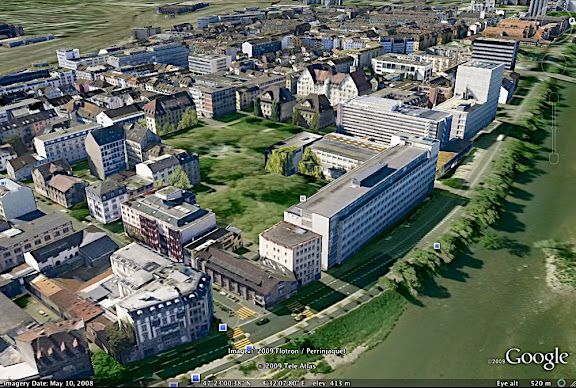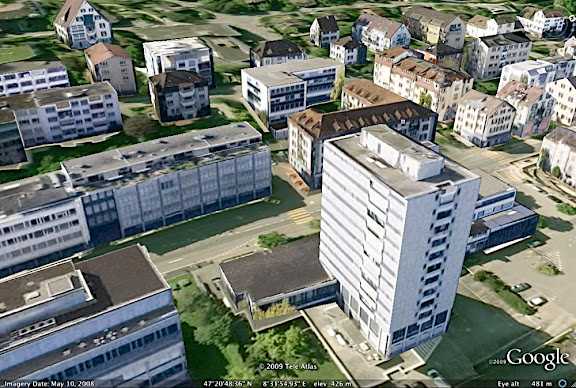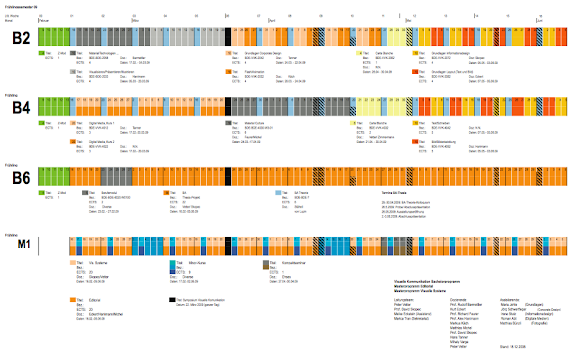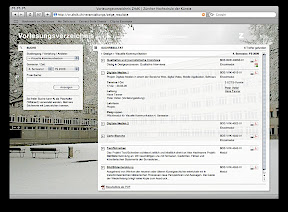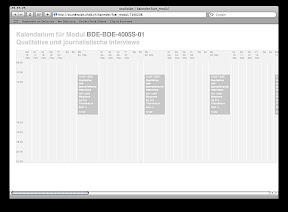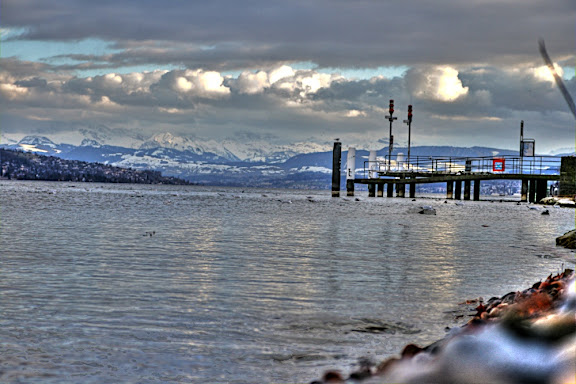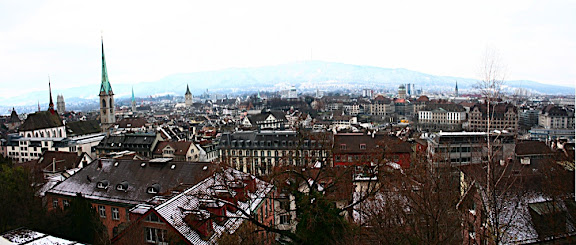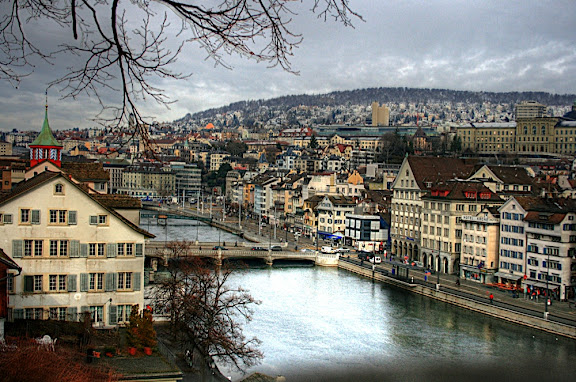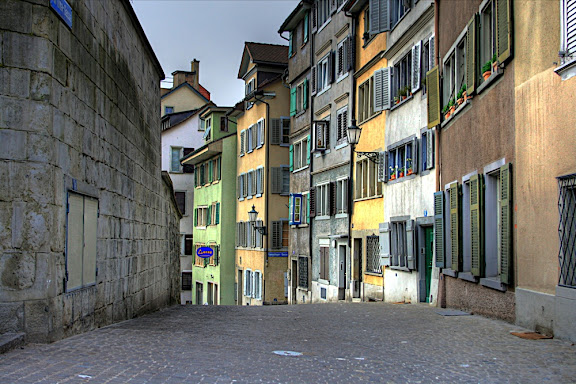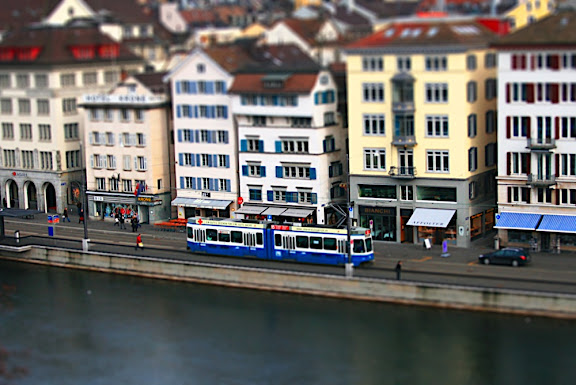Saturday, 28 February 2009
Moving Day
It was moving day today. I left my 13 square metres room in a 12 people shared flat on the 2nd floor of a student halls building and moved into exactly the same room on the 3rd floor. I've now got a couple of stairs more to walk but I'm also a couple of stairs closer to heaven—or the roof terrace, overlooking the roofs of Zurich-Wollishofen and mountains. Also, since my window is facing west now, I have more sunlight, trolley buses driving past every 2 minutes and the view over the Uetliberg, the highest mountain in Zurich.
If printed matter was as flexible as digital productions, a certain booklet would have gained another page now.
Wednesday, 25 February 2009
More about the art school dilemma
Tuesday, 24 February 2009
A toy town in 3D
Above: University of the Arts, Ausstellungsstrasse 60
Above: Wollishofen, Zurich
Monday, 23 February 2009
The first week
Last Monday we started the Digital Media module with a briefing. The 20 students on this module are being taught by one professor, one lecturer from the industry and two assistants, one of which is an expert in corporate design and the other one in webdesign so we get support in both of these areas. It all seems very well thought through and it´s a brief written specifically for us, not a recycled one that´s been done for years and years. The lecturer from the industry used to work for Kahn + Associates in Paris (they do some nice visualisations, check them out), then for Yahoo! and now works as an interface designer for Skype in London. Because she was still in London when the module started, she briefed us via Skype! I don't know if she did that purely to impress us but it sure worked. Yes, 20 students and 3 lecturers in Zurich talking to a macbook and looking at the projected screen with this woman explaining the brief — live from London! A bizarr experience. No offence—but tutors back in Bristol find it hard to work a projector and have difficulties playing a Quicktime movie on a Mac; these guys here set up a video conference that worked absolutely flawlessly without even thinking it was anything special! I was very impressed.
The 8 page project brief of our project which is entitled "Social Networking 55+" explains the current situation of social networking sites, and the task is to develop a platform for a digital cross-generational social network under consideration of universal design, information architecture, usability and legibility. Then there´s a schedule with the different project stages and what´s to do, it´s a 5 week project and we have presentations every other week. It says exactly what we need to do each week, similar to the one professional brief we had last semester that was belittled as "spoon feeding" by some people that can't handle a professional approach. We also have two workshops like "design process for digital projects" where we talk about user centred design, personas and scenarios, information architecture and maps, wireframing and prototypes, user testing(!), visual design, specifications and style guides in the first one and the other one is called "visual design for the www" covering typography, grids, structure, hierarchy, whitespace, colours and accessability. The final result to hand-in is a concept presentation, a clickable prototype for chosen scenarios, home page and a printed documentation in an edition of 5 as well as a digital version of it! Yes, that´s how they deal with module files. How I understand it, they have to actually design a printed presentation (book) according to certain style guides that explains your process, research, design stages and everything and then they take the digital version of it and compile it into a bigger book and everybody gets a copy at the end. But I'll explain that later, when I know more about the details.
After the briefing, the students devided up into teams (by themselves, without class politics, without drawing numbers) and started working on the brief. I forgot to mention that the briefing started at 4.30pm and these guys stayed in the studio until 8ish and then went for an Apero, which in itself was interesting as they actually talk about interesting stuff in their spare time, design related things, usually typography. They're very passionate and 'elitist', and actually know what they're talking about. They have an opinion and they can defend it using actual arguments and not just killer phrases like 'just get on with it'. It feels really good to be able to have intelligent conversations with people that know what they're doing and don't just pretend to know stuff. Next morning they started at 9am for their independent(!) study and worked on their concepts—self motivated—on the first day after the briefing. The Swiss are really keen on working.
Tomorrow we'll present our ideas to the class, with actual presentations that they take seriously like a sales pitch. It´s been only a week but judging by the amount of work it feels like I've been here for a month already. And it´s really enjoyable so far.
Tuesday, 17 February 2009
Same same but different
Although it´s a five storey building with basement, they seem to suffer a constant lack of space. Apart from the vocational school there´s the department of design in this building with the specialisations industrial design, interaction and game design, scientific visualisation (their illustration course) and visual communication (that´s me) and also a lot of other art courses that I didn't really keep track of. UWE has that as well—lack of space. But that´s probably the only similarity in this respect. Apparently there are two computer labs but they're not open access. That´s the reason why I had to sign a bit of paper and confirm "to bring my own computer to use" because "without my computer I'll get no admission to study". Every student gets a studio space. That´s the traditional three-walled desk with a number of drawers and internet access. The 20 students actually seem to spend a lot of time in their studio. The walls are lined with type specimens, pictures, photocopies, large drawings of letters with typographic measurements written all over it. One student told me that these are the remains of a type design module last semester where they got instructed by an assistant of Adrian Frutiger (yes, the great swiss type designer of Univers and Avenir) in creating typefaces. I actually felt a bit embarrassed and uneducated when I looked around this 2nd year studio. Apart from the obvious (unfamiliar) typographic interest and knowledge pinned up on the walls, there are paper samples, lecture notes from their last HTML and CSS course, more lecture notes explaining professional print production, all indicators that their academic education during the last 3 semesters was a lot more relevant than mine and yet didn't lack creativity. Because of the studio space, the students seem to be constantly motivated. They come into uni and do the work, they discuss it while they're at it, they bond, they bounce ideas off each other and although that´s a corny phrase I think that´s what´s lacking in Bristol.
Coming back to the infrastructure and equipment of the place. I like UWE for their excellent workshops, even though I don't use them a lot. But I know where they are when I need them. At first it didn't seem like there´s any wood work, printing, laser cutting etc. here. But after asking around I found out that these centres do exist, but it´s not like everyone is using them all the time. It´s mainly industrial designers that make use of this machinery, everybody else just gets their stuff done there if they need it. The print facilities are in a different building apparently. I heard they offer very good letterpress courses (like actual courses, not just a workshop day) but they need to be booked separately.
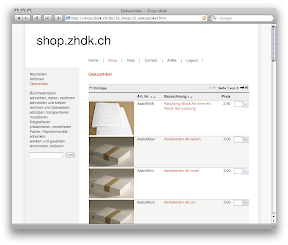 I always thought the art materials shop at UWE was a bit awkward. It´s basically a window where you buy paper and supplies over the counter. The supplies shop in Zurich is very different. It´s not a walk-in shop either—it´s an online shop! They have a range of over 3000 stationary products to order. You just pick it up at the university. And I thought the solution at UWE was awkward. But that´s not the only shop they have. The ITZ is the equivalent to the EPI centre. Not only do they provide the IT infrastructure, an IT helpdesk, workshops, various projects (e.g. a group for fans of open source software) and the production of websites and software—no, they also run a faculty Mac shop! It actually feels like the art materials shop at UWE just instead of somerset paper and faber castell pencils, with macbooks, mighty mice, wacom tablets and other mac related hard- and software to student prices on the shelves. Awesome!
I always thought the art materials shop at UWE was a bit awkward. It´s basically a window where you buy paper and supplies over the counter. The supplies shop in Zurich is very different. It´s not a walk-in shop either—it´s an online shop! They have a range of over 3000 stationary products to order. You just pick it up at the university. And I thought the solution at UWE was awkward. But that´s not the only shop they have. The ITZ is the equivalent to the EPI centre. Not only do they provide the IT infrastructure, an IT helpdesk, workshops, various projects (e.g. a group for fans of open source software) and the production of websites and software—no, they also run a faculty Mac shop! It actually feels like the art materials shop at UWE just instead of somerset paper and faber castell pencils, with macbooks, mighty mice, wacom tablets and other mac related hard- and software to student prices on the shelves. Awesome!Like at the media centre at UWE students can also hire various technical equipment here. Beside audio and video equipment, lighting, projectors, monitors, various players, tripods and all the usual stuff, you can also rent ibooks, iMacs, powerbooks and external hard drives. Furthermore there are bookable rooms like a video editing suite with 14 workstations, a sound recording studio and a photo studio including lighting and Nikon D200 camera. Actually very similar to UWE.
The library is completely different. Bower Ashton has 30,000 books and 190 periodicals. This one here has 3 million books and 1289 periodicals. A huge library? No, it´s tiny! The library is basically just a room with 30 study spaces, 15 of them with ethernet connection and 9 of them equipped with a Mac (note that there really are no PCs anywhere, not even in the library). The latest books and 184 periodicals are on display. So where´s the rest? The books are stored in the basement in some weird robotic storage system that automatically delivers a title to the library desk when it´s requested. The rest of the 3 million books are everywhere around the country. The libraries in Switzerland are all connected and within 24 hours you can have virtually any book you want. The downside is that you really need to know how to use a library catalogue and that you can't browse through the shelves. On the AV side, the library has 7000 DVDs, 1700 of them can be watched directly as a video stream. I think I'll miss browsing through the DVD shelves and discover weird documentaries that I can watch for my own entertainment though. Also the library keeps an archive of all final projects ever produced at this university and of all the exhibitions at the design museum. So there´s a nice catalogue of objects, prints, books, posters and packaging.
This list isn't complete without mentioning the organisational systems at this place. As we know, at UWE it´s simple: you get 2 modules per semester and you have to do them. In the 4th semester you get to choose one out of five and don't really need to worry or even think about anything. Here it´s different. I'd like to point out the semester timetable:
What a beautiful piece of information design (and it´s done in Excel by admin staff!). It´s just a complete mystery. There´s no way you could figure out what this means when you're not familiar with the whole system. But once you understand what you're doing, it´s actually useful.
There are theory Mondays, where we get to pick one out of 7 modules at 6 credits each. They are all lectures about politics and society and I guess it´s about the same as Visual Culture. Following the lecture on monday there´s a workshop on academic writing and a seminar about the issues raised in the lecture (all with a few credits as well). Then there is a 5 week module on Digital Media which is compulsory for everyone and earns you 6 credits as well. Following on from that is another module that we can pick out of 7 (different ones). This is an interdisciplinary and practical module with 6 credits again. After that follows a 2-week and 2-credit compulsory "carte blanche" module where details follow closer to the date. After that I picked an information design basics module with 5 credits and there´s a compulsory texting module with 5 credits as well. There were 2 study trips on offer, one to Lyon and Marseille and the other one to India, but I decided that Switzerland is enough culture shock for me this year. So overall I managed to get my required credits even though it took me a lot of running around and knocking on doors, getting wrong bookings cancelled and getting assistents of professors to explain everything to me in standard german.
It´s meant to be a simple module booking system. There´s a directory of all modules online on a fancy website that´s even changing the background image according to the time of the day and the year. It allows you to download the module description as a PDF file (not Word) and even subscribe to the events with iCal. What´s blackboard for UWE is evento for ZHdK. Here you can see all the modules you're enrolled to, print your own timetable and keep track of your credits. You can even download the contact details of your class mates (as .vcf files of course), if they allow it in their privacy options. Like at UWE, some lecturers don't seem to like using it, so it´s losing some of it´s effectivity. But it´s still a useful tool and works fine, as long as you don't attempt to delete a booking again. That´s what happened to me and it helped me to get to know a lot of members of staff.
Anyway, that´s my first impression of the place. It probably forgot to mention half of what I actually wanted to say. Some things are absolutely awesome, others make me miss the convenience I have in Bristol. Overall I have the feeling that this is a lot more professional. The standard seems a lot higher, which doesn't simply mean you just need to be 'better', no it´s more like you have to work harder, do more, do more relevant things rather than just pretty or nice stuff. Students here seem to know what they're doing, reflect on it very carefully and are highly motivated. Though that´s just my first impression and might change after a few weeks. So let´s see how I get on.
Sunday, 15 February 2009
Make your own art school
My preliminary answer is 'No, but it´s a nice thing to have'. Is it really worth three years of my life and more than three grand each year though? Sometimes I think about it as a consumer. I pay money to receive a certain service or product. This product is education, academic education since it´s a university. However, art school is a special type of university. Things are not typically scientific, logical, graspable, measurable, assessable and usually a bit weird—and that´s intentional. Personally I think I could've easily studied science, languages or maths and be reasonably good at it. But I didn't. I wanted to learn the craft of design, because that´s what I've been interested in.
It used to be so simple. A typesetter used to serve an apprenticeship in typesetting. They got taught how to use the technical and visual tools to create a design and make it ready for print. Although typesetters as such don't exist anymore, the apprenticeship is still common in Germany for example. It´s just called 'designer for digital and print media' now. I used to serve an apprenticeship as a printer and went to the same school as my media designer colleagues for my theory lessons. We had the same typography lessons and solved the same maths problems. We had the same IT teacher and wrote the same essays. The only difference were the technology lessons, where the printers learnt how to adjust rollers and pressure, what boiled linseed oil does in lithographic inks and how to take colorimetric measurings and draw a dot gain curve while the media designers learnt how to use Quark XPress, create design grids and write HTML pages. It is a professional three year training that allows you to call yourself a designer once you pass your final exam. It is hands-on education, they work in real studios for real clients and the best thing: they get paid to do it. It was fate that made me train as a printer but I always wanted to become a designer after this apprenticeship.
It seems obvious to me that academic education, which I pay for, should be either of a better quality than just an apprenticeship or provide me with an education that is fundamentally different to just learning the craft of a designer. When I look back at my academic design education, I'm not sure where I stand now. The foundation course really got me going. I experimented with a wide range of materials, techniques and disciplines, challenged my ideas and understanding of art and design and produced pieces of work that I'm very pleased with. I feel that through the first year of my degree course my progress came to a sudden standstill. I didn't produce anything new and the quality of my work didn't get anywhere near what I had produced previously. It was a rather frustrating experience. Throughout year one and two I felt that my progress had to suffer in order for other people to catch up. Again and again I heard the words 'we want to get everybody onto the same level' which usually meant for me—as a self-motivated individual—that I had to twiddle my thumbs and watch other people making their first steps. The quality of teaching from my subjective point of view was poor; apart from a view modules (namely the visual culture module on postmodern theory and the career module that helped me to position myself in relation to the professional design world) I learned nothing new through the lectures that weren't lectures and the exercises or projects didn't allow me to stretch myself as much as I would've needed it. After three semesters of my degree course I was rather disappointed and frustrated.
The only way how I survived as a design student with an enormous thirst for knowledge was through developing strategies to supplement my learning. Now, reading books is the most obvious way of doing that and it´s an integral part of any university education. As a paying customer, you'd expect some guidance what books are worth reading but as we all know the directed reading lists in all likelihood didn't get the amount of thought from tutors as one would expect. So it´s down to the individual to browse through library catalogues and periodicals, which I did. Through various workshops the course tried to get every student onto the same level of industry standard software knowledge. A noble thought on the one hand, dumbed-down simplified teaching on the other. Those who have ever tried to put the name of their DTP software of choice combined with the word "tut" or "tutorial" into the almighty Google will know that there is a vast range of very accessible material out there to teach you everything, from the first steps to advanced production in virtually any industry standard software or technology. Using the commercial service lynda.com would even be cheaper and more efficient than paying tuition fees.
simplifiziertes Lehren auf der anderen. Wer einmal versucht hat die DTP-Software seiner Wahl kombiniert mit dem Begriff "tut" oder "tutorial" durch das allmächtige Google zu jagen wird wissen, dass es eine rauhe Menge an sehr zugänglichem Material gibt, das einem alles lehrt—von den ersten Schritten bis zur fortgeschrittenen Produktion in praktisch jeder Industriestandard-Software oder Technologie. Selbst wenn man den kommerziellen Service lynda.com nutzen würde, wäre das noch günstiger und effizienter als Studiengebühren zu bezahlen.
There is a range of cheap or even free services that are not only supplements to academic learning, no they could probably even replace a three year design course and save you tens of thousands of pounds. As a matter of fact I learnt more about design debates from typo Berlin design talks, about software with lynda.com training videos (with a free 7 day trial), about resources and practical matters through reading blogs such as smashing magazine or a list apart, and actual academic lectures from iTunes U to name but a few. So how about books? There are libraries in every town and they're free too. I'd suggest that their stock will normally outweigh the faculty library by far. But how about feedback? In the first year one of the tutors demonstrated how much money we pay for our university education. He really emphasised the large sum of money with the intention of highlighting the importance of attendance. It was back then, that I first started to think about this issue and to have a closer look at what I pay for. He argued that our fellow students are our most important resource and that feedback and formal critiques are the things that we really pay for. But can't you get together with likeminded people outside of university? Even in the virtual space you could use a number of design forums, design student forums like precore or more specialised forums like typophile to get feedback for your work from a range of both experts and people that sit in the same boat as you. And if you really dare, you could take part in design competitions. Many of them are free and it gives you briefs to work on that are usually more articulate than what we got last semester.
I'm not suggesting to get rid of art schools and to simply turn to free or nearly free resources out there. Many of the resources only exist because there are art schools and obviously learning isn't limited to one´s time at university. But I do question the approach that I experienced in my personal design education. I suggest that through democratised design education, where specialist knowledge is available to anyone and virtually free, design schools need to react, change and adapt to a higher standard. Otherwise there´s no reason for me to continue making debts in order to pay for wasting my time. I just don't think that I get enough challenge and encouragement through my course, I'm treading on one spot. All this is told from my point of view as a student after a foundation course and three semesters at a BA Honours course in Graphic Design. I have no idea about the situation at other design schools both in Britain and internationally, but I'd be very interested to find out.
Tomorrow I'll start my guest semester at the Zurich University of the Arts. I expect this to be a different learning experience which might be better or worse or perhaps even the same. It´s going to be interesting to see how students in a different country and at a different university but with a comparable academic standard are learning to become designers. This experience could clarify my future or confuse it even more. After all, everybody is and will always be in charge of their own learning. So go ahead and make your own art school.
Thursday, 12 February 2009
High Dynamic Zurich
More Photos here.
Wednesday, 11 February 2009
Photographic Zurich
I walked through the little big town today and took the Polybahn cable car to the observation platform from where I took a panorama picture (as you can see above). I was intrigued by the building behind me—namely the Swiss Federal Institute of Technology or ETH, one of the two large universities in Zurich and among the top universities in the world with graduates such as Wilhelm Conrad Röntgen, who discovered the x-rays and Albert Einstein, who discovered a lot of other stuff. I sneaked into the university and had a nose around. It´s an impressive building with lots of nerds and business people walking around. I found an art gallery inside with an interesting exhibition about image puzzles. There was a free tour starting just when I walked in, so I decided to sneak into that one as well. Very inspiring.
There is so much going on in this little town. There´s a coffee museum and one that shows wax figures of diseases. There´s as much art as cheese fondues and so many other interesting oddities that are just waiting to be discovered. I'm not sure if a semester is enough to see all of this.
Although it was freezing cold and I risk to lose my index finger while I'm snapping away, I couldn't resist the temptation to take some HDR photos of this wonderful town. These photos are from the center, but I also took my camera to the lake to capture the beautiful view over lake Zurich and the alps at the horizon. My battery died in the cold but I promise to post the result very soon.
Here´s a first take on High Dynamic Zurich.
Tuesday, 10 February 2009
Living in a toy town
I walked up to the Lindenhof and took some photos of the hustle and bustle along the river Limmat. Having modified the depth of field in Photoshop, you can see what I mean when I talk about the toy town.
Monday, 9 February 2009
A home in Switzerland
Prices for a room in a shared flat range from around 400 to 1000 Swiss Francs. That´s about £230 to £590 per month for a small room that´s usually about a 20 minute tram ride from the centre. Of course there are more expensive ones and ones that are even farther from the city as well. Rooms in Zurich are so expensive that quite a few people sublet them when they're on holiday for a week or two. I wouldn't be comfortable with the idea of living in someones room for a few months, when they leave all their personal stuff behind. Isn't that taking exchange a bit to literally? I mean it´s not wife swap or something. I don't want to live someone else´s life for a while (do I get their friends and jobs too?). What also cracks me up is the emphasis on "wooden floors". It'll cost you a fortune and is in the middle of nowhere but it has wooden floors! I don't care if the floor is wooden, carpet, lino or concrete! Besides, they almost all have wooden floors, it´s not like this would sell it to me.
Rant over, I am a lucky bastard not only once, but twice. When I went to the office of the association which is managing the place I'm staying in for this month, to sign my contract, I asked if there were any other rooms available from next month. At first I got the same answer that I got when I asked them in an email before: Everything is booked out two months in advance. But then the lady suddenly remembered a room that she had previously missed. It´s a 14 square metre furnished student bedroom for 340 Francs, available from the 1st of March. It matches the description of my current room exactly and it´s at the same address—just one floor up. "I would take it if I were you" she said and so I did. I'm very lucky to get a room that cheap. It´s not what I dreamed of, but I was in doubt that I'd get a romantic little timber house in the mountains with a cow outside that wears a bell around it´s neck waiting to give me milk for my muesli anyway.
This one is a 20 minute tram ride from the centre, it´s by the lake, it´s warm and quiet. The room and desk are huge, it´s got a modern kitchen with a touch control ceramic hob, lots of storage space. No romantic wooden blinds but outside shutters that lock out light completely. The only downside for me is that it´s shared between 12 people but on the other hand, the Swiss are rather clean. The flat upstairs is supposed to be cleaner than the one I'm living in until the end of the month but this one is actually not anywhere near as dirty as the average English student flat.
On the plus side, I'll have an easier moving day and I can delete the numerous 'flat-sharing in Zurich' feeds and enjoy the week without flat hunting and settle in before uni starts next week. Oh, my address until March will be:
Pascal Raabe
Tannenrauchstrasse 35
bei Karipidis / BK 210
8038 Zürich
Switzerland
From March then you can send me postcards and love letters to
Pascal Raabe
Tannenrauchstrasse 35 / BK 305
8038 Zürich
Switzerland
If you wish to call me, my mobile number in Switzerland is
+41788546934
Sunday, 8 February 2009
I'm a legal alien with a place in a bomb shelter
The Swiss seem to be very suspicious and careful people. When I had a look at the basement, where the bicycles (velos) are stored and where the laundry is being dried in this house, I noticed a very thick reinforced concrete door with a few interesting signs. I wonder what this is?
Hey, this is actually a bomb shelter! I found out that there is a law in Switzerland, that requires every residential building to contain a bomb or air-raid shelter in case of war. If there was a war breaking out right now, 95% of the population would have a place in such a shelter (the other 5% are probably the ones that didn't make it to the registration office yet). The shelter is operative within 24 hours, this includes stocking food, beds and supplies. Measures what to do in the event of war are published in every phone book on the last page. The air-raid shelter is checked every 5 years to make sure the reinforced doors and hatches close tightly and the air vents can be operated by hand.
This is a country that sits right in the middle of Europe and hasn't had a war in about 200 years. However, in the unlikely event of a sudden war, they're ready to defend their little country. Soldiers who serve in the Swiss army are even allowed to take their firearms home, so in the event of war they can fight their way through to wherever they have to go. Because there is compulsory military service for every young male Swiss between the age of 19 and 25, armed youngsters are not an unusual sight at train stations. Because of the militia I think it´s safe to say that Switzerland has more guns per head than the USA. This is actually a very controversial topic in Switzerland and similar to the US there are people passionately arguing for and against guns. Nevertheless it´s interesting to know that Switzerland has a significantly lower rate of violent crimes relating to knives and guns than Britain, where people are not even allowed to buy a bread knife without ID. Children here play peacefully with Swiss Army Knifes and I doubt that anybody would have a problem with it. Evidently it´s not the weapon that´s responsible for crimes, it must be something else. Perhaps the British should have a closer look at what makes people hate each other before they start to make fists illegal since bread knives, hoodies and baseball caps are already not allowed. Treating symptoms rather than the cause is in my opinion very typical for Britain (don't get me started on the health system).
Anyway, I better stop here before it turns into another rant ;-) I pretty much enjoy being here and I find out more and more odd and interesting things about this weird bunch of people every day. I shall continue sharing it with you.
Saturday, 7 February 2009
I love Airport Security
*Why did I have HP Sauce in my pocket? Because I had an ostrich burger at Yoyo burgers before I left.
Friday, 6 February 2009
The Switzerland Adventure
Long story short, five trains and a bus later (none of which I booked or even had a valid ticket for) I found myself at the Airport, managed to get two extra kilograms of luggage without paying and used a very clever croissant trick to sneak two additional bags through the security check. At Luton Aiport (as some might know if they watch the extremely thrilling TV programme), there is a special security woman whose only job is it to make sure nobody takes more than one bag through to the people that then x-ray them and touch your genitals if they like your underwear on the screen. This woman is extremely observant. Beside my not so little hand-luggage suitcase, I carried a bunch of stuff in a carrier bag—like scarfs, gloves, my camera bag and croissants. Of course she wouldn't let me go through the pearly gates like that—I'm a threat to the nation. So I stuffed the empty carrier bag into one of my coat pockets (that were already very bulky), the gloves into the other, two scarves around my neck and my camera bag over my shoulder. Surely she wouldn't mind me holding some croissants in my hand while I walk through security. But she took issue with the camera bag. On previous flights from Stansted, Bristol, Berlin, Paderborn, Münster, Hahn and Düsseldorf the camera bag was never an issue. In Luton however a very grumpy looking woman points her finger at it and says "that needs to go into your bag". She obviously had no idea what my bag looked like inside, the zipper was about to burst. So I interpreted her request that she wanted my croissant—which I held in the same hand that she was pointing at—to go into my bag, not the camera. Good thinking. Opened the suitcase, removed the clear plastic bag of liquids in 100ml bottles, put croissants in its place and closed the suitcase again. Then the trick: part 1—this was an excellent opportunity to move the camera bag from the shoulder that was facing her when I walk past to the other shoulder and cover the whole thing with two scarves around my neck. Part 2—obviously airport security bag-checking staff is very well trained (after all they protect our nation) and this wouldn't be enough to trick her into thinking that I'm harmless and not a terrorist. So—distraction! — "Is this clear plastic bag with lots of 100 milliliter bottles of random stuff but obviously no explosives in an overall amount of under 1 litre alright like this?" — "Yes that´s fine!". And she wouldn't even ask why I look like a human lorry with all this junk stuffed into my pockets, let alone notice the extra bag. In the departure lounge then I could finally empty them into my carrier bag again and continue my journey. Aren't airports lovely and entertaining?
The flight was alright—well, EasyJet—and I left Britain with a nice view over devastated snow land. Landed in Zurich, where a beautiful Akzidenz Grotesk said hello and switched on my type and information design spotting senses. Rather critical is my opinion of the public transport maps and timetables or the design of it. It took some getting used to—nothing majorly wrong with it, but it could be better. The public transport itself obviously stands in a strong contrast to Bristol´s 'bus drivers turn up when ever the hell they like' system. Tickets—or Billets as they're called—are valid for everything: trains, buses, trams, ferries, cable cars and trolley buses. Yes, trolley busses—that´s a weird cross breed between a bus and a tram. Like a bus with overhead collectors, driven by the electric tram network. On a completely random note, luggage trolleys are called shopping trolleys in Switzerland.
A trolley bus took me to the youth hostel, where I was staying—in a student halls type of accommodation behind the youth hostel. I managed to secure this room for this month and also to negotiate pay in cash. If you want to completely freak out a cashier person at Natwest, go and tell them that you wish to transfer some money to a bank account in Switzerland. She actually showed a physical shock reaction, it was hilarious. Well, pathetic for a bank—but hilarious. Just like the customer "service" woman at Natwest thought I was a bit dodgy when I wanted to transfer my rent to a swiss bank account, the person that was subletting her room to me probably thought the same when I paid her in cash. Cultural differences, there you go.
It´s a reasonably large room, about two by six metres with a wardrobe, a huge desk, a chair that gives me backaches, a tiny bed that looks a bit dodgy, a sink and some shelves. It´s in a shared flat with 12 other people with two shared toilets, a shared shower and a big kitchen slash common room. I have found the swiss equivalent to student halls—although not allocated by the university and open for all type of students from colleges, universities, schools or apprenticeships. I have met two of my twelve flatmates: John(?) and Ali. Both turkish and they don't speak German. But they seem nicer than the turks I know from Germany.
After throwing all my stuff into the room I was shattered and starved. So I went to a traditional swiss restaurant and had some horse for dinner. It was delicious. Having returned to my room, I started with the joys of unpacking and finding out what I forgot to take with me. Here´s the list: bed linen, a backpack, a travel adapter for schuko plugs and an ethernet cable. Which means I had to sleep in a very very dodgy bed, carry more stuff around in my bulky coat pockets, don't blow dry my hair and scan the neighbourhood for unsecured wifi connections. Well, what can I say—two days and it works out well so far. It´s a bit cold though, because I have to open the window in order to get a better wifi signal—which could potentially lead to a cold when I do that with wet hair, but the extreme sunshine makes up for that.
Yes, it´s sunny in Zurich. Britain collapses under a snow avalanche and I'm enjoying the sun at lake Zurich and the river Limmat.
And tomorrow I'll buy some bed linen.
Monday, 2 February 2009
Emergency State
England is in emergency state. Well, kind of. For the first time in the three years that I've been living in this country, the bad weather actually manifests itself in what Europeans normally refer to as snow. When English people say snow, they usually mean somewhat white stuff in a flakey or hale-like shape that falls from the sky. It usually is more a form of ice rain, hale stones, sleet or simply half-frozen British weather. But this time it´s different. It´s actually snowing!
And that means England is in emergency state. The media talks about "extreme weather", everything grinds to a halt, schools stay closed, inches turn into feet, people spend the entire day staring out of the window (watching the snow melt, I imagine, is about as exciting as watching paint dry), cyclists dismount and push their bikes, buses don't run, train lines are suspended—including the tube (does it snow underground?); drivers are advised to travel only if it´s absolutely necessary—its dangerous! Needless to say that planes get cancelled naturally because the snow apparently turns taxi ways into ski slopes, which also means that I am pretty god damn lucky not to have opted for the Berlin trip that was to depart today but also pretty god damn worried about my trip to Zurich on Wednesday, where I'm going to rely on car, train, tube, bus and plane. This is bound to be disastrous. Oh dear.
So let me share this blizzard—this monster of a bad weather condition—with you, as I caught it on camera, when it was sitting in our garden today, but be warned—it´s nasty:
I was looking forward to a talk by Clay Shirky tonight. As part of the Festival of Ideas he was to give a talk in Bristol about how the internet is transforming our social lives, which was a great opportunity to hear a great man speak. Unfortunately the event got cancelled due to the adverse weather conditions and Mr. Shirky didn't make it to Bristol.
Instead I spent some time on facebook, experiencing this said transformation in practice and changed my status message to "Paz joins the club of people commenting something about snow". And because I have nothing better to do, I'd like to share everybody else´s status messages with you. So here´s some social snow:
... Airpoint is missing windows, its snowing inside...pretty.
... is loving the snow!! :D.
... is SNOW!
... just opened the window and a billion snowflakes just flew in!
... loves the snow, but please don't cancel our flight!
... ♥ snow.
... loves the snow!
... is going to the park to play in the snow!
... is off to have a snowfight!!
... is happy to be back from London before it all went tits up!
... is off too Berlin and its snowing in Bristol Yeay!
... HATES snow.
... is still at her parents looking at the snow =].
... is snowless.
... is snow ♥ snow ♥ snow
... is snowed in and has a worse cold than yesterday. The situation is actually quite hilarious. I might miss my coach back to Bristol today because of the weather.
... overslept...bring on the snow!
... got up for work, but theres no work... just SNOW!!!!! ♥.
... is snow'd in ..in reading !
... THINKING SNOW, SNOW, SNOW!!!!!
... is happy the snow followed him back to southampton!!
... has been reunited with his wallet... and wants to go and play in the snow.
... it´s STILL snowing!
... snow!
... wants the snow to come back.
... YEY FRIKKING YEY! SNOOOOOOOOOOOOW!
... wonders why it´s snowing in Weston but not here :(.
... hope the snow sets :)
... Let it snow! Let it snow! meh i wanna go outside and play ha.... was shocked to see 15cm of snow at Heathrow this morning! Now looks like it´s followed me to Weston....
... you should never take a country seriously that grounds to a halt in inches of snow... pathetic..
... made it home! THANK YOU EL. Is feeling extremely ill and will spend the rest of the day (if not week) indoors. Snow is beautiful though.
... 6 ft, or rather 1 cm deep in snow... 5 - 10 cm my backside....
... its sunny outside OMG its sunny, fuck the snow im going to sunbathe...
... is Procrastinator extrodinaire!! Uni coursework or snow....mmmmmm?
... wants to live somewhere snowy :(
... has been dancing in the snow blizzard lol
... thinks everyone shud stop making comments about the snow! its not enough to slead or build a decent snow man ! FFS.
... Lives in London all her life and then it snows, properly and she´s in Hong Kong!!!
... is appreciating to the snowness but not the strandedness.
... just opened the window and a billion snowflakes just flew in!
... overslept...bring on the snow!
... so much snow in london!
... got up for work, but theres no work... just SNOW!!!!! ♥.
... is unhappy her flight to Berlin was canceled due to the snow in Bristol : (
Snow in England—it was actually a massive event! Even for people that weren't in the country when it happened. I hope things will be back to normal on Wednesday. I expect within three days they'll figure out how to run a country with a few flakes floating down from the sky—or am I wrong?
Sunday, 1 February 2009
Time to feed back
Formal feedback did manifest itself on a form which I picked up last Friday. Together with the provisional mark of 64 (a 2:1 in academic assessment terms) and a number of boxes that were ticked by the tutor who 'looked after me' for the duration of the last set project. Because—in a recent comment—I was accused to obviously not understand the links between the given projects and therefor failing to meet the aim of the module which was to gain an understanding of my design process, I was now going to explain (for those that are unfamiliar with it) the underlying assessment criteria and what my level of achievement of 64% actually means. However, having just read through those criteria, I think it could be both difficult and a bit pointless to do so. The criteria given in the module brief have been—who would have thought—apparently copied and pasted together from some other document and therefor make it difficult to me to make sense of it in a way that outsiders would understand. I only just noticed that it contains phrases such as "exceeds the threshold profile in respect of at least three out of four of the criteria" when the stated threshold profile actually contains five criteria. In my opinion this is not just a little typo, it becomes a big issue when someone tries to weigh my work against those criteria that don't make it clear if 75% is meant (equals three out of four) or 60% (equals three out of five) or perhaps 80% (equals four out of five in the attempt to adjust the threshold). I'm never happy am I? Ok Liam and everybody else who´s rolling their eyes right now, I'll stop finding errors of sloppiness relating to this module and therefor move on to something more substantial—the actual feedback (not without pointing out that that box, which reads "Demonstrate an understanding of their personal design methodology" has the highest rated tick on the entire form right in the middle of the column reading 'very good'—Yep, looks like I didn't miss so much after all).
Right, here we go, actual feedback: "Very well presented module file ..." (I created an information system that divided up my supporting and research work into logical parts relating to the assumed assessment criteria) "... with strong technical ability through out [sic]. For me the most considered piece of work in your portfolio was the typo-graphy book. Excelent [sic] application". This is interesting, apparently the book really caught attention and many people liked it, which makes me feel proud and relieved. The book wasn't part of the set tasks, I spent a few spare hours on it and therefor didn't invest a lot of time into research or experimentation. It was an idea conceived out of anger, frustration and a cheeky mood and quickly implemented, considering mostly practical issues relating to the production of it. I agree, it was an excellent application. With it being seen as the "most considered", it´s good to know that this consideration seems to come naturally to me. I suppose this assumption is reconfirmed in the next section where it states that I am working well and must continue to challenge myself on a daily basis in order to improve as a designer. All well and good, I just can't help being left a bit puzzled about the phrase that says "I would like to see this level of engagement with all your work". I mean, there was no secondary research, no experimentation, nothing new compared to the other projects which I spent weeks on. For me, there was a much higher level of engagement in—for example—creating Digby´s Trumpet, with plenty of freshly acquired skills being applied or the "How To ..." book with a load of research into all sorts of vaguely related matters. Perhaps the outcomes of those aren't as "nice", but isn't that just a spontaneous aesthetic judgement rather than an evident level of engagement? Or is the area of improvement for me merely in the perceived level of engagement ie. work that looks like it was lots of work? I suppose that´s what I can extract for myself from this feedback, and that´s fair enough.
I have also fed back my personal opinion of what should be changed in relation to the teaching methods applied in this module. We were given a feedback form to fill out for the tutors and I sat down with a friend and discussed the issues that pissed us off the most. We then put them down on paper, hoping things will be considered and changed not only for the next generation of students but also for ourselves in future modules. Just to pick up the matter of what all the complaining is about: I personally think we have a responsibility for our own education, that´s why I complain and fill out feedback forms with open and honest opinions; but I also think this can be a valuable public debate for future generations of students. By making these things public, other people can be aware of those issues and it doesn't just get brushed under the carpet. Prospective students increasingly make use of the web and social networks for their research in order to find out what university is most suitable for them. By voicing my opinion through those media, I allow them to get some inside opinions about a course like this one (when they put "University of the West of England" or "UWE" and "Graphic Design" into Google—yes, that was to make sure it gets found ;-) ). I certainly would have appreciated this at the time when I was researching which course to choose to steer my career and my future. And this is why I'm doing this publicly. It´s not naming and shaming (note that I haven't mentioned any names), if anything it´s more or less a warning (besides all the other things that I already mentioned).
To sum it up, here´s a list of things that I'd like to have changed if possible. It´s suggestions how—in my opinion—the module could benefit. It´s probably more work for tutors and lecturers but also better value for money for students. And that´s what should matter to a university, or in other words a business that sells education.
- ban the copy & paste mentality
- consider information architecture in briefs
- ensure suggested references are relevant and up-to-date
- communicate clearly both visually and verbally
- prepare instead of improvise lectures
- practice what you preach
- eliminate sloppy and time-wasting activities
- take students' feedback seriously, judgemental comments ("whoever wrote this didn't get it") are inappropriate
- treat students as adults
- ensure written and spoken instructions match up
- spell-check everything
- embrace change, just because it´s been done for years doesn't mean it'll work forever
- treat students with respect, not as a "pain in the arse"
- embrace university-wide standard information tools such as blackboard and (real) timetables
- revise information policy, students need to know what´s going on
- attendance does not suffer when students are informed but when they don't see the point in attending (cf. attendance record in Research in the Commercial World)
- project weighting should be made clear ("100% for everything" doesn't help students prioritising their work when project durations differ so vastly)
- do not use a meaningless numbering system in briefs (project one, one and three quarter, one and half, two, ...)
- consider professionalism, a process-based module doesn't have to be unprofessional
- be nice every now and then
Some of these suggestions might be trivial, nevertheless they should be taken seriously. I would really just like to enjoy a good university experience. Unfortunately it feels all to often like primary school. Let´s see if we can change something.
To refer to one of Liam´s points in his recent comment, why don't I fuck off elsewhere if I don't like it here? Well, I got the opportunity to spend the next semester in Switzerland. I'm currently preparing myself to take the plane to Zurich this Wednesday coming and experience design education at the Zurich University of the Arts. I will be studying visual communication there until the summer and hopefully gain an insight into a different university life. It might be better, it might be worse. Either way, I'll keep the readers of this blog and my tutors at UWE updated about my experiences. Let´s hope for the best.

